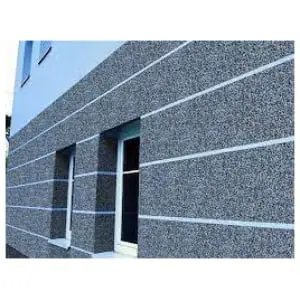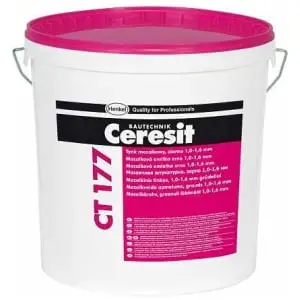Mosaic Renders
Mosaic Renders — Durable Resin Stone Finishes for High‑Traffic Facades
Mosaic renders deliver resilient, resin‑bonded stone finishes that protect plinths, entrances and corridors from daily wear. Moreover, the textured surface hides marks, resists dirt pickup and cleans down easily, making them ideal for busy residential and commercial zones. For a proven option, consider CT177 mosaic render in 10 kg and 25 kg packs with a wide colour palette to match both contemporary and traditional schemes.
Where they work best
Firstly, use a mosaic render on ground‑floor plinths, entrances, stairwells and corridors that face frequent contact and splash. Secondly, the stone‑chip texture maintains a uniform appearance on corners and reveals. Finally, when durability, easy cleaning and long‑term colour stability are priorities, these finishes provide a practical, attractive solution.
Colours, textures and components
Plan your colourway in advance to coordinate trims and adjacent materials. In addition, browse our curated render colour charts to select grain blends and tones with confidence. Consequently, you can achieve consistent, repeatable results across larger elevations and detailed plinth zones.
Substrate preparation and primers
For best adhesion and even texture, always use a quartz contact primer under a mosaic render. Specifically, prime with quartz primer (CT16 quartz primer) or Atlas Cerplast, matched to the system and substrate. Moreover, correct preparation helps the stone layer cure uniformly, improves resistance to soiling and supports long‑term durability.
Applications & compatibility
Mosaic finishes can be applied to sound, properly prepared basecoats and selected interior substrates. Therefore, verify compatibility with existing coatings, ensure clean and stable surfaces, and follow manufacturer guidance on temperature, shading and working times—especially in strong sun or high heat—to keep a consistent texture and colour.
Popular products
- Ceresit CT177 Mosaic Render — resin stone finish for plinths, entrances and busy walls
- CT16 Quartz Primer — top‑coat primer for uniform absorption and adhesion
- Atlas Cerplast — quartz primer to support even texture and colour consistency
- Render Colour Charts — plan tones and grain before ordering
Expert support & UK‑wide delivery
Need help selecting colour, grain size or primer pairing? Our team can advise on mosaic renders for UK facades, recommend the right mosaic render specification and arrange fast delivery nationwide. Furthermore, we provide practical guidance for consistent on‑site application and maintenance.
FAQ
What is a mosaic render and where should I use it?
It’s a resin‑bound decorative stone finish designed for high‑traffic plinths, entrances and interior circulation areas that need durable, easy‑clean surfaces.
Do I need a quartz contact primer?
Yes. Use CT16 quartz primer or Atlas Cerplast to promote adhesion and achieve an even texture beneath the stone layer.
How do I choose colours and grain?
Start with surrounding materials and exposure; then select from our render colour charts and test small areas to confirm appearance in natural light.
Mosaic Renders — Durable Resin Stone Finishes for High‑Traffic Facades
Mosaic renders deliver resilient, resin‑bonded stone finishes that protect plinths, entrances and corridors from daily wear. Moreover, the textured surface hides marks, resists dirt pickup and cleans down easily, making them ideal for busy residential and commercial zones. For a proven option, consider CT177 mosaic render in 10 kg and 25 kg packs with a wide colour palette to match both contemporary and traditional schemes.
Where they work best
Firstly, use a mosaic render on ground‑floor plinths, entrances, stairwells and corridors that face frequent contact and splash. Secondly, the stone‑chip texture maintains a uniform appearance on corners and reveals. Finally, when durability, easy cleaning and long‑term colour stability are priorities, these finishes provide a practical, attractive solution.
Colours, textures and components
Plan your colourway in advance to coordinate trims and adjacent materials. In addition, browse our curated render colour charts to select grain blends and tones with confidence. Consequently, you can achieve consistent, repeatable results across larger elevations and detailed plinth zones.
Substrate preparation and primers
For best adhesion and even texture, always use a quartz contact primer under a mosaic render. Specifically, prime with quartz primer (CT16 quartz primer) or Atlas Cerplast, matched to the system and substrate. Moreover, correct preparation helps the stone layer cure uniformly, improves resistance to soiling and supports long‑term durability.
Applications & compatibility
Mosaic finishes can be applied to sound, properly prepared basecoats and selected interior substrates. Therefore, verify compatibility with existing coatings, ensure clean and stable surfaces, and follow manufacturer guidance on temperature, shading and working times—especially in strong sun or high heat—to keep a consistent texture and colour.
Popular products
- Ceresit CT177 Mosaic Render — resin stone finish for plinths, entrances and busy walls
- CT16 Quartz Primer — top‑coat primer for uniform absorption and adhesion
- Atlas Cerplast — quartz primer to support even texture and colour consistency
- Render Colour Charts — plan tones and grain before ordering
Expert support & UK‑wide delivery
Need help selecting colour, grain size or primer pairing? Our team can advise on mosaic renders for UK facades, recommend the right mosaic render specification and arrange fast delivery nationwide. Furthermore, we provide practical guidance for consistent on‑site application and maintenance.
FAQ
What is a mosaic render and where should I use it?
It’s a resin‑bound decorative stone finish designed for high‑traffic plinths, entrances and interior circulation areas that need durable, easy‑clean surfaces.
Do I need a quartz contact primer?
Yes. Use CT16 quartz primer or Atlas Cerplast to promote adhesion and achieve an even texture beneath the stone layer.
How do I choose colours and grain?
Start with surrounding materials and exposure; then select from our render colour charts and test small areas to confirm appearance in natural light.



